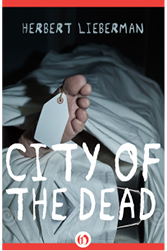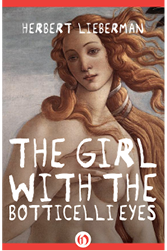The Girl With the Botticelli Eyes (42 page)

At the first two levels, Manship more than qualified for the job. It was at the third, however, where he knew he fell down. Consequently, he never took the rumor of his candidacy too seriously.
Sitting there at a corner of the table, where an extra chair had been quickly moved in for him, he felt the suffocating weight of all eyes turned upon him. It occurred to him that what was happening was unreal—much like a dream in which the mind tells you that what you’re seeing is all just imagined. Now that at last the moment had come (and he had thought about it for years), he felt a curious absence of any feeling at all.
After some seconds, Manship pushed his chair back and rose to his feet. Resting the tips of his fingers lightly on the table’s edge, he directed his response to the question eye-to-eye at Walter Van Nuys.
“I am pleased that the board has chosen to award me this position. You honor me greatly. Of all comparable positions in this highly special, unrealistically privileged world we’re lucky enough to inhabit, directorship of this institution is the single position I’ve coveted most.”
The words flowed from him with surprising ease, his gaze never once leaving the engorged red face of his employer. “But were I to accept this position,” he went on, “it would mean that Walter Van Nuys would have to leave his. Since he is the antithesis of everything I think a museum should be, we could never function together in the same professional climate. And so, knowing that Mr. Van Nuys is not about to leave the Metropolitan, I must respectfully decline …”
A short time later, Manship walked out through the pillared main entrance, down the long stone stairway, a jaunty bounce to his step, and out into the bright crisp morning. Having tendered his resignation, leaving behind him a dozen mouths agape, he was then, for all intents and purposes, unemployed, a little nervous about the future perhaps, but marvelously free.
T
HE FOLLOWING SPRING, MANSHIP
found himself in Lugano, the recipient of a quickie consultancy job for Thyssen-Bornemisza. He’d come to authenticate a Giotto, finished earlier than had been anticipated, and, finding himself with nearly five days to kill before he was due back in New York, he decided to drive down through the lakes, where he hadn’t been since the early days with Maeve.
He rented a small car and struck south for Maggiore. The plan was to spend several days on the shore of the lake, prowl forest paths and possibly, do some boating. Then he would strike south again for Milan, from where he would fly home.
But his plan was not to be. An old friend, chief curator at the Poldi-Pezzoli, tracked him down at his hotel and invited him to Milan. It appeared that the Poldi had been offered a highly prized Pontormo at a very attractive price. The offer had been tendered by a Florentine aristocrat with cash-flow problems and a reputation for shifty trading. Eager for the painting, the Poldi man was reluctant to move without someone of Manship’s stature to certify it.
With certain misgivings, Manship agreed to have a look at the painting. It happened to be in Florence, and possibly that had something to do with his accepting the job.
Driving in his rented Audi, Manship and his friend set out on the autostrada for Florence the following morning. As it turned out, the Pontormo was a copy, and. not a very good one at that. Manship advised his friend against it. Effusively grateful for helping him to avoid a catastrophic gaffe, Manship’s colleague placed an overly generous check in his hand and boarded the next train back to Milan.
Manship had no reason to go to Fiesole—certainly not Isobel Cattaneo. On a conscious level, he’d written that off months ago and scarcely thought of her anymore. To all intents and purposes, it was now a dead issue. Still, he had a whole afternoon to kill (he was flying back to New York the next day), and he thought he might like to go up to the Bandini and look once more at the Fra Angelico and Filippo Lippi, both long favorites of his. The fact that the Bandini happened to be in Fiesole did not strike him as particularly significant.
Driving up from the Piazza San Marco, he found to his disappointment that the Bandini was closed. A cardboard placard nailed to the front door explained that the museum was undergoing refurbishment and would reopen in the fall.
Somewhat at a loss, he sat at an outdoor café in the central square, sipping a Campari beneath a large striped umbrella, his eyes scanning the blue haze of Tuscan mountains in the distance.
Having exhausted that activity, and with an impatient waiter hovering nearby, silently demanding he either order another Campari or have the decency to pay his bill and clear out to make room for the next party, Manship decided to leave.
From that point on, his recollection of events was sketchy. He liked to think that the direction he’d taken from the town square was entirely random. But it was no more random than the daily rise and fall of tides. Starting out with nothing special in mind, he found his pace gradually quickening and his breath coming more rapidly. Approaching his destination, it was as though he were tethered to an invisible leash tugging him inexorably forward.
It was no more than five or six minutes by foot from the town square. When he looked up, he wasn’t in the least surprised to see there before him the Villa Tranquillo, just as shabby and down-at-the-heels as it had been that first time. Peeling paint slowly drifted downward into the orange-globed trumpet vines that crept along its water-stained outer walls.
Despite all that, the place still had a kind of easy, slapdash charm. Come in, if you care to, it seemed to say. It didn’t particularly care what you thought of it.
He lingered there, wavering between two choices, it was so close. What could be the harm? She’d be annoyed, of course. It might be embarrassing. He’d feel like a fool. And what if she had someone with her, someone new?
He rang the bell, at first tentatively, then three or four times somewhat more insistently. The sound of it rattling through the upper halls echoed with a gloomy vacancy. To his relief, no one answered.
He walked around the side and through a rusty wrought-iron gate. A tiny cowbell tinkled as he entered. He saw her instantly. She was there in the garden, stooped over, elbow-deep in a stand of poppies. The cracked cupid trickled a stream of water through its tiny genitals, making a pleasant plashing sound into the stone basin just beneath it.
He stood there for a while, having no wish to disturb her. Instead, he sat down on one of the half-sprung chaises on the flagged patio, where they’d sipped tea together that first time.
She worked on for several minutes, not noticing him, the click of her pruning shears wafting up to him. When at last she looked up, an expression of mild surprise crossed her features. Nothing more demonstrative than that. Moments later, to his surprise, she smiled and waved. It was one of those ineffably Italian gestures that manage to say everything without the need for words. This one said: Wait there. I’ll be right with you. It was that easy, as though they’d seen each other the day before, as if she’d been expecting him.
Kneeling, she clamped the stem of one vibrantly pink poppy between her teeth as she pruned and snipped at others. At last, she gathered the bunches of them, along with cosmos and ranunculus and blue cornflowers she’d cut to bring into the house.
As she came toward him beneath a battered old straw hat, he saw that she was nodding. She’d taken the poppy from her mouth and held it out to him, while with the other arm she bundled the big bouquet to her breast. It was the Simonetta look to be sure, but centuries removed from that mythological orange grove where the Primavera had stood while the spring months, bearing flowers, all came swarming around her.
Once again, he had the strange sensation of having lived it before—just as in those final days of September as they sat together in the ground-floor kitchen on Eighty-fifth Street, the crumbs and scraps of unfinished dinner on the china plates between them. Like then, this moment had that same air of well-worn familiarity, that sense of drowsy timelessness, as though sitting there with her in that garden had always been, would always be.
When she came up on the patio, she laid her flowers on the nearby table and flopped down into the chaise beside him. The light at that moment had the soft, perfect clarity of Tuscan spring afternoons, when the days have grown longer and the darkness holds off for a time.
She didn’t speak, nor had he felt any particular need to. But just when he thought he could feel the quiet perfection of the moment slipping away and the old stiffness and distrust returning between them, she stirred. “You’re really serious about this?”
“I’ve had enough time to think about it.”
“And?”
“I’d like to give it a try.”
“It won’t be easy. I’m not easy.”
“Neither am I, God knows.”
“Well, so at least we start even.”
“Even.” He nodded while she rolled the stem of the poppy dreamily between her fingers.
After a while, she rose and placed her bouquet in his arms. “Will you carry those in for me? I’ll get a vase.”
Manship rose and followed her.
A
N ITALIAN CIRCUS OWNER
and entrepreneur acquired today the entire collection of stuffed human figures discovered in the attic rooms of the Palazzo Borghini in Rome, or, as it came to be known during the recent trial of Count Ludovico Borghini, the notorious “house of horrors.”
The Italian government has decided to grant a license to Signor Attilo Zampano to purchase for the sum of 230 million lire the entire collection of
tableaux vivants,
which had been impounded in warehouses for eight months throughout the course of the trial. According to Culture Minister Ronchey, the money derived from the sale is to be used to restore and maintain what he described as “museum-class” works of art.
Signor Zampano has acquired permission to take the collection on tour with his Circo Magico throughout Europe and North America. He reports that as early as last week he’d already arranged for as many as sixty bookings in cities throughout the world, including in the United States.
Characterized as Grand Guignol, the Borghini studies, fashioned from the skins of once-living individuals and posed to replicate famous works of art, have already become the source for a certain kind of black humor that has become all the rage throughout Italy. Also, a dance called the
tableau vivant,
in which the participants assume for long periods of time the poses of famous subjects in master paintings, is currently sweeping the discotheques of Rome, Paris, London, and New York. As recently as two days ago, the Vatican released a statement expressing its horror at the commercialization of such material.
When questioned regarding the propriety of publicly displaying such ghastly subjects for profit and gain, Signor Zampano disputed the notion that his motives were in any way venal. “These are great works of art,” he insisted. “And as such, they have great educational value. In a free society,” he went on, “the public has a right to view what they choose without government or church interference. Like it or not, that is the essence of a free society.”
About the Author—
Il Messagero,
Rome9 July 1995
The author of
Crawlspace
,
City of the Dead
,
The Climate of Hell
, and several other acclaimed novels, Herbert Lieberman is a recipient of the Guggenheim Fellowship and a winner of France’s coveted Grand Prix de Littérature Policière. He lives in Los Angeles with his wife.
All rights reserved under International and Pan-American Copyright Conventions. By payment of the required fees, you have been granted the non-exclusive, non-transferable right to access and read the text of this ebook onscreen. No part of this text may be reproduced, transmitted, downloaded, decompiled, reverse engineered, or stored in or introduced into any information storage and retrieval system, in any form or by any means, whether electronic or mechanical, now known or hereinafter invented, without the express written permission of the publisher.
This is a work of fiction. Names, characters, places, and incidents either are the product of the author’s imagination or are used fictitiously. Any resemblance to actual persons, living or dead, businesses, companies, events, or locales is entirely coincidental.
Copyright © 1996 by Herbert Lieberman
Cover design by Tracy Dunham
978-1-4804-3265-9
This edition published in 2013 by Open Road Integrated Media
345 Hudson Street
New York, NY 10014






